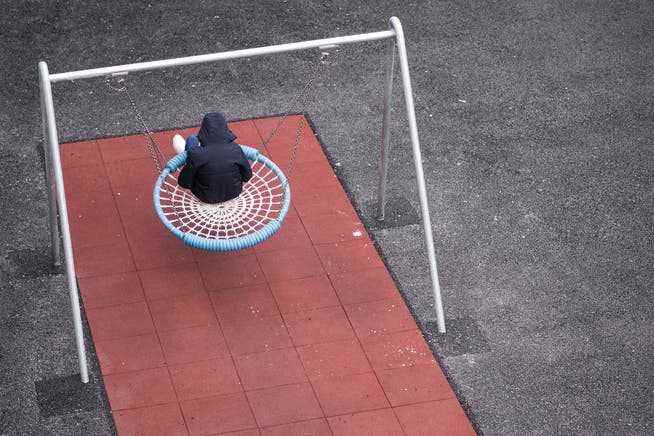An independent consulting company has examined the processes in the center – and has come to a clear conclusion.
Since the opening in 2019, left-wing parties and organizations have been complaining about the conditions in the federal asylum center on the Duttweiler site.
The Federal Asylum Center in Zurich-West has a bad reputation – at least in certain circles. Since the opening in 2019, media reports have repeatedly read about unbearable conditions, about a security regime that is far too rigid, about overwhelmed employees and plagued asylum seekers.
Refugees are “treated and harassed like thieves” here, criticized the left-wing AL party in line with asylum NGOs. Even the head of social affairs in Zurich and SP man Raphael Golta allowed himself to be carried away to the statement a few years ago that the goal of decent accommodation was not being met in the federal asylum center.
Is everything really that catastrophic?
The Zurich Asylum Organization (AOZ) has investigated this question. The independent public institution owned by the city of Zurich is responsible for the care of asylum seekers in the center on behalf of the federal government. In 2021, the AOZ announced an independent review of the allegations. Now we have the results.

The new center awakened “associations with a prison” among idealistic AOZ employees.
The main finding of the almost 60-page investigation report: in the Federal Asylum Center there are “no systemic deficiencies in the organization that make a significant structural or personnel adjustment necessary”. There were a few problems at the beginning. Over time, however, the processes had become established and the living conditions for the residents had improved significantly.
The study was carried out by the consulting company Res Publica Consulting; The former SP politician and CFO of Winterthur, Yvonne Beutler, was in charge. 21 people from the AOZ, the city of Zurich and the federal government were questioned intensively, comparisons were made with other asylum centers and files were sifted through. A broad employee survey was also included in the study.
“Culture shock” leads to resentment
The report shows that the center in Zurich is a special case in many respects. After reading it, you have to ask yourself whether it really was such a clever idea to plant the federal institution at this location, in the red-green city of Zurich.
The Zurich city parliament, which is dominated by left-wing parties, is responsible for the overall supervision of the AOZ. As a result, municipal politicians take care of the processes in the Federal Asylum Center with corresponding frequency and intensity – but they actually have little to say about them.
The report says about this special political constellation: “The asylum system is a controversial topic, which in the city of Zurich has led to a considerable number of advances in parliament with corresponding debates over the years.” The contrast between the urban, politically strongly left-leaning municipality of Zurich and the politically middle-class environment at federal level, which specifies the framework conditions in the asylum area, plays an important role. In short: ideology and reality collide.
On the one hand, the constant criticism of the Federal Asylum Center can be explained by this special circumstance. The investigation report cites another reason: the city of Zurich carried out a five-year test run before moving into the center on the Juch site in Zurich-Altstetten. Other, more lax rules prevailed in this “barracks village”. The asylum seekers had more freedom, for example they could receive visitors without being asked and leave the premises at any time.
The move to the newly created Federal Asylum Center in 2019 was “difficult”, according to the report. The AOZ management staff was heavily burdened and did not adjust their employees well enough to the new circumstances. Compared to the Juch, the sparse functional building in Zurich-West “evoked associations with a prison”. On the other hand, the scope for action for the AOZ employees has become smaller because different actors are now responsible for the operation. The report speaks of a “culture shock”.
Above all, the new security regime annoyed some idealistic AOZ people; it was “diametrically opposed to the care philosophy that has been lived up to now”. Disappointed employees turned to the media with their criticism. Among other things, they complained that a private security service now relied on control, peace and order – and not on mutual trust as before on the Juch site. The security guards wore new uniforms and carried out body searches.
Prepare AOZ employees better
It is interesting that the cooperation with the security service was by no means rated negatively by all AOZ employees. In the employee survey, it was given a total of 4.35 out of 6 points. Many commented that they now felt safer at work because no more weapons, drugs or stolen goods were being smuggled into the centre.
Despite the basically mild verdict in the independent investigation report, the authors make a few suggestions for improvement: In future, the AOZ should better clarify the “expectations of the applicants” in the recruitment process and later train the employees more carefully. More resources are also desirable.
The Zurich city council writes in a statement that it still considers it “right and important” that the Federal Asylum Center is in Zurich. In this way you can “make a significant contribution to the quality of accommodation and care”. New one wants to promote the exchange between asylum seekers and the resident population more – with the expansion of the offer in a so-called meeting room, which has been there for three years.
